[caption id="attachment_8159" align="aligncenter" width="1024"]
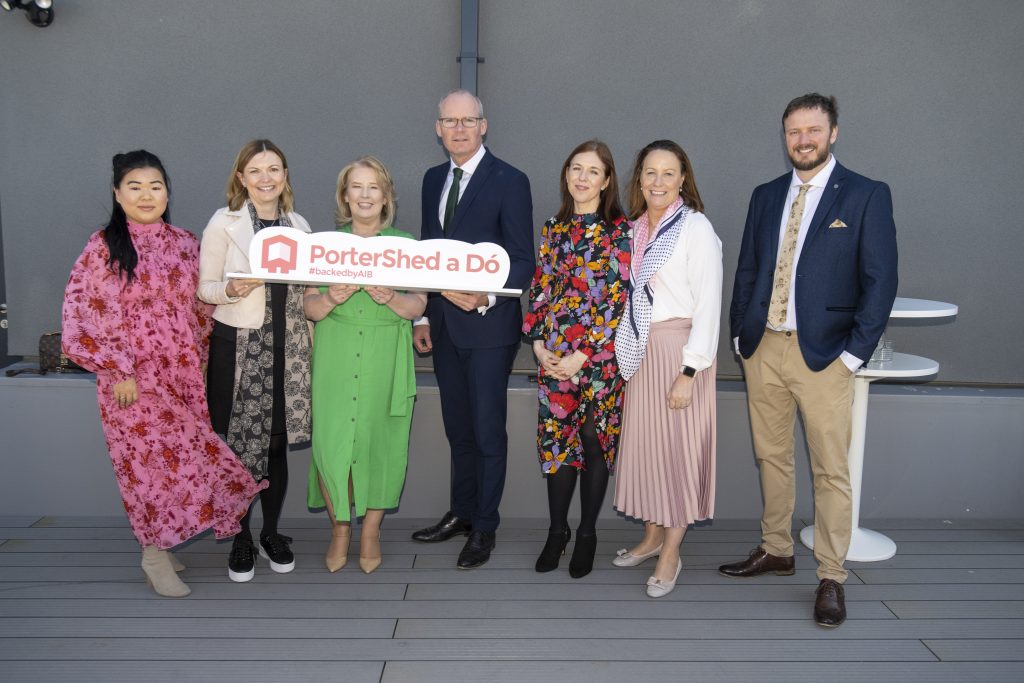
(L-R, Aoife Cheung, Office Manager, Portershed, Amanda Nelson, CEO of Vodafone Ireland, Mary Rogers, CEO of PorterShed, Minister for Enterprise, Trade and Employment, Simon Coveney, Amanda Glancy, Director of Corporate Affairs, SIRO, Sheila Kavanagh, Network Director, Vodafone Ireland, Anthony Shaughnessy,Community and Production, PorterShed)[/caption]
The official opening coincides with the organisation's 7th birthday. Founded in 2016 the PorterShed has to date supported the creation of more than 835 high value jobs in the region. The new building, funded by the Department of Enterprise Trade and Employment through Enterprise Ireland's Regional Enterprise Development Fund (REDF) initiative, will become home to an additional 200 indigenous tech startup members, offering a collaborative innovation space, access to SIRO and Vodafone’s full fibre broadband, production studio, boardroom podcast studio, rooftop garden, and conference rooms.
PorterShed has already established itself as a hub for innovation and entrepreneurship under the banner of Galway City Innovation District, creating a down-town innovation community in the heart of Galway City.
[caption id="attachment_8156" align="aligncenter" width="1024"]
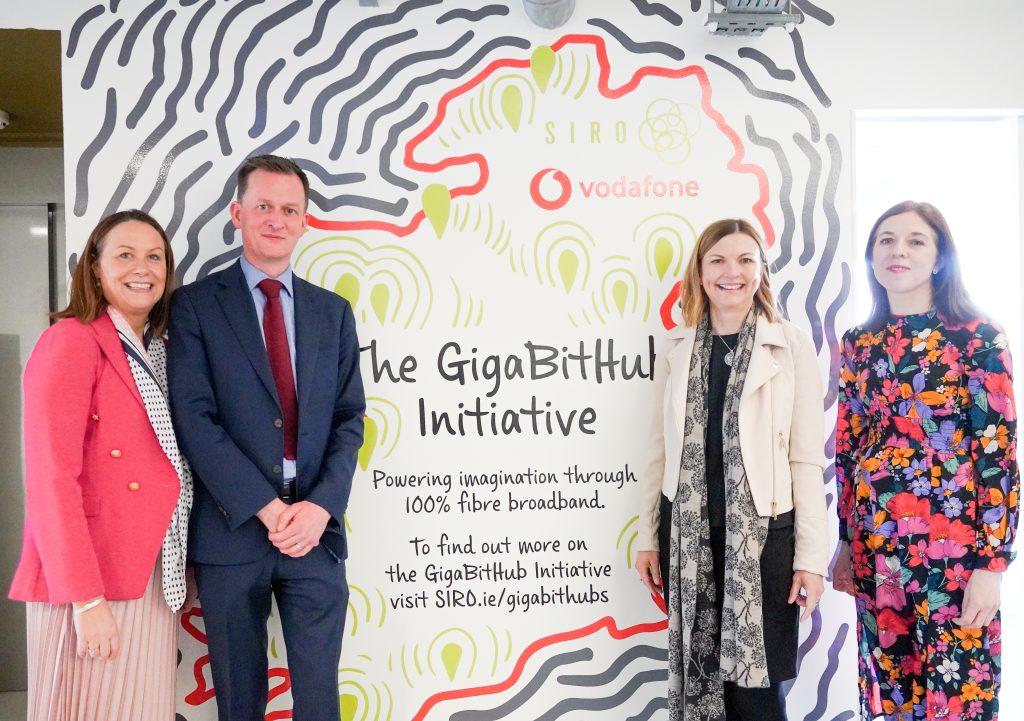
(L-R, Sheila Kavanagh, Network Director, Vodafone Ireland, Robert Marshall, Senior Public Affairs, Vodafone Ireland, Amanda Nelson, CEO Vodafone Ireland, Amanda Glancy, Corporate Affairs Director, SIRO.)[/caption]
Speaking at the official opening, Minister Coveney said he continues to be impressed by the growth of the tech sector in Galway and acknowledged the impact of the PorterShed in the region since it first opened in 2016.
“I am delighted to be here today to officially open PorterShed a Dó in the heart of Galway city. This remarkable state-of-the art facility in the former iconic Connaught Tribune Building will play a central role in enabling the growth of scaling enterprises in the West and further afield.
The opening of Portershed a Dó, supported by over €2.9m in funding from my Department’s Regional Enterprise Development Fund, will further cement Galway’s reputation as hub for innovation and provide high potential businesses with the space and support they need to flourish and prosper. It is an example of one of the many enterprise initiatives the Government has supported throughout the country. The West Regional Enterprise Plan is responsive to the opportunities and needs of the region and focuses on regional collaboration. PorterShed is an example of the power of that collaboration, and I hope and expect that it will inspire similar initiatives in the region. I wish the centre and all the companies and entrepreneurs that avail of the facilities on offer every success for the future.”
[caption id="attachment_8157" align="aligncenter" width="1024"]
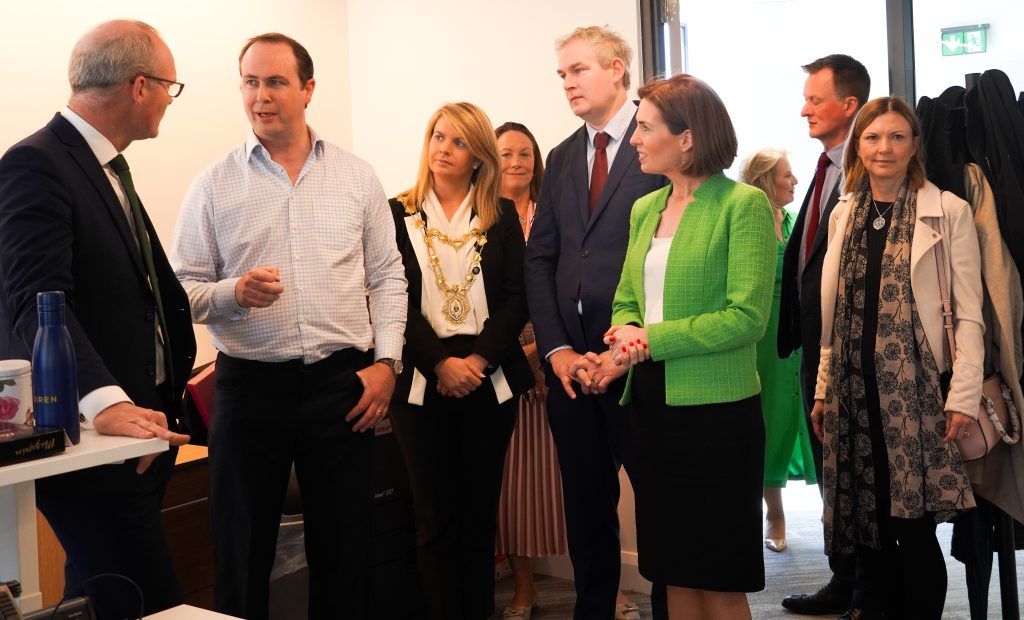
(L-R, Minister for Enterprise, Trade and Employment, speaking with Siren, member of PorterShed present with Mayor of Galway, Clodagh Higgins, Sheila Kavanagh, Network Director, Vodafone Ireland, Senator Sean Kyne, Government Chief Whip and Minister of State at the Department of Health, Hildegard Naughton, Mary Rogers, CEO PorterShed, Robert Marshall, Senior Public Affairs, Vodafone Ireland, and Amanda Nelson, CEO, Vodafone Ireland.)[/caption]
Maurice O'Gorman, Chairperson of PorterShed, said:
"We are thrilled to be celebrating our 7th birthday by opening this new building, which will provide even more opportunities for tech startups to innovate and grow. We are grateful for the ongoing support of Enterprise Ireland who have been pivotal partners and funders for the PorterShed since 2016.”
John Keaney, CEO of SIRO, said:
"We are pleased to be a part of the PorterShed story. Launched in 2017, the GigaBitHub Initiative has enabled digital hubs across Ireland to thrive by providing enterprise-grade symmetric, full fibre broadband. In 2022, the Portershed became the 17th hub to join the initiative, and we are proud to have played a role in supporting the growth and development of startups and innovative businesses in the Galway region. We look forward to continuing our partnership with PorterShed and supporting their mission to foster a culture of innovation in the community.”
[caption id="attachment_8158" align="aligncenter" width="1024"]
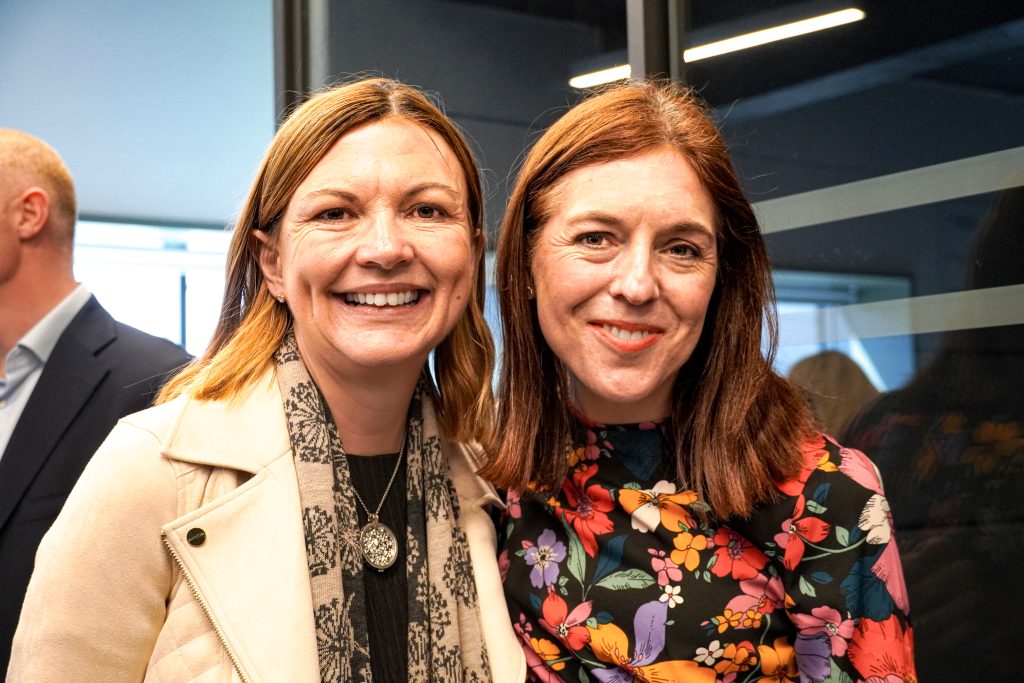
(L-R, Amanda Glancy, Corporate Affairs Director, SIRO, Amanda Nelson, CEO, Vodafone Ireland)[/caption]
Amanda Nelson, CEO at Vodafone Ireland said:
‘It is fantastic to see hubs just like the PorterShed continue to go from strength to strength. Today’s opening of PorterShed a Dó, demonstrates the continued value, demand and need for smart working hubs throughout the country. Through our Gigabit hub initiative our goal has always been to empower local businesses and communities through connectivity. The PorterShed is a shining example of what’s possible when we look at how connectivity can enable and enhance the work life balance of the people it serves, ultimately allowing them to pursue their careers within the area they are from, without sacrificing their quality of life or being forced to move to larger cities or abroad’’
The PorterShed is also supported by AIB, KPMG, Enterprise Ireland and The Western Development Commission.
SIRO and Vodafone are currently seeking applications for the
GigaBitHub initiative. For more information, please visit www.siro.ie/gigabit-hub
For more information about PorterShed and its new building, please visit
www.portershed.com 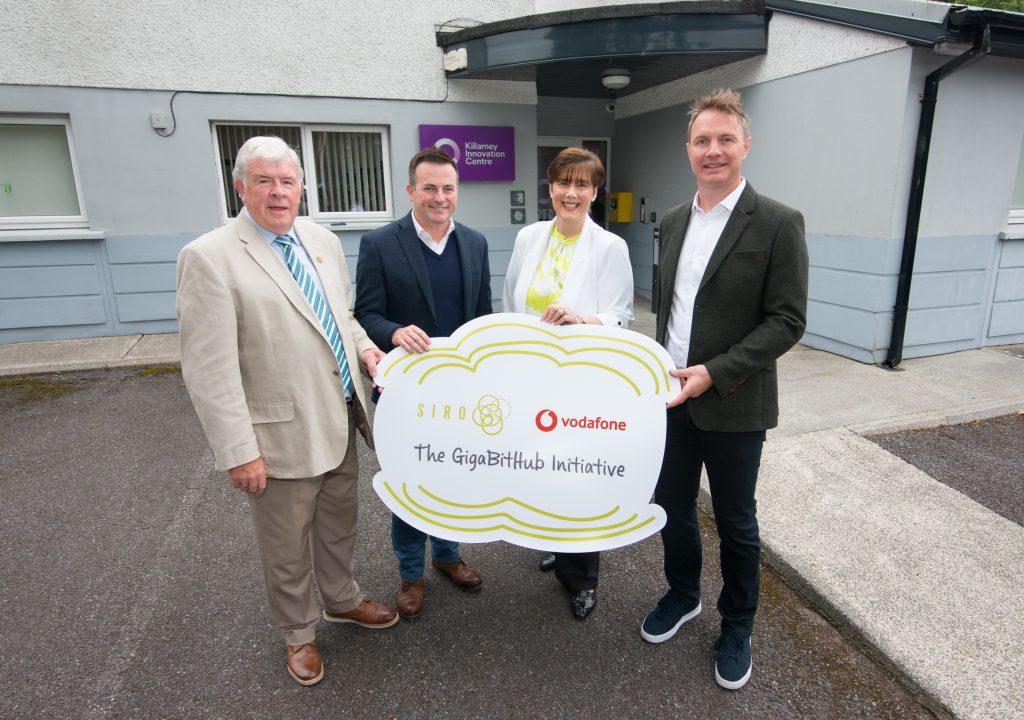 Pictured at Killarney Innovation Centre from left: Sean Counihan, Chair of Killarney Innovation Centre, Ronan Whelan, Chief Commercial Officer, SIRO, Minister for Education Norma Foley TD and Chris Stagg, Consumer Director, Vodafone Ireland. Photo: Pauline Dennigan[/caption]
Since its establishment in the late 1990s, the Killarney Innovation Centre has been a cornerstone of Munster’s entrepreneurial ecosystem. Housing a diverse array of companies—ranging from financial treasury solutions and software development to sports statistical analysis and health & safety consultancy—the Centre has become a pivotal hub for collaboration, knowledge-sharing, and innovation in the area. Over the past two decades, more than 120 businesses have found a home within its walls, collectively creating thousands of jobs, stimulating local supply chains, and significantly contributing to the local economy.
The Killarney Innovation Centre joins over 20 leading digital hubs across Ireland, including Galway’s PorterShed, Skibbereen’s Ludgate Hub, and Dundalk’s Creative Spark, in benefiting from Vodafone-SIRO’s Gigabit Hub initiative.
By joining the Gigabit Hub initiative, the Centre will now provide its residents with access to Gigabit full fibre broadband, ensuring they have the state-of-the-art connectivity needed to excel in today’s digital economy.
As a not-for-profit organisation, the Killarney Innovation Centre has consistently offered a nurturing environment for start-ups, SMEs, and established businesses. With high-quality facilities, including flexible office spaces, co-working areas, and modern meeting rooms, the Centre has played a crucial role in driving economic development and job creation in the region.
Integrating SIRO’s Gigabit broadband will greatly enhance the Centre’s capabilities, offering unparalleled internet speeds that support advanced technological applications such as AI, Big Data, or Cloud computing, and seamless global communication. This upgrade will attract more start-ups and established businesses to Killarney, further stimulating economic growth and innovation.
As the business landscape evolves, the Killarney Innovation Centre remains dedicated to expanding and adapting its services. Future plans include a significant expansion of the hub’s size, advanced co-working spaces, and additional meeting and conference rooms equipped with the latest audiovisual technology.
Minister for Education Norma Foley TD speaking at the launch event noted:
Pictured at Killarney Innovation Centre from left: Sean Counihan, Chair of Killarney Innovation Centre, Ronan Whelan, Chief Commercial Officer, SIRO, Minister for Education Norma Foley TD and Chris Stagg, Consumer Director, Vodafone Ireland. Photo: Pauline Dennigan[/caption]
Since its establishment in the late 1990s, the Killarney Innovation Centre has been a cornerstone of Munster’s entrepreneurial ecosystem. Housing a diverse array of companies—ranging from financial treasury solutions and software development to sports statistical analysis and health & safety consultancy—the Centre has become a pivotal hub for collaboration, knowledge-sharing, and innovation in the area. Over the past two decades, more than 120 businesses have found a home within its walls, collectively creating thousands of jobs, stimulating local supply chains, and significantly contributing to the local economy.
The Killarney Innovation Centre joins over 20 leading digital hubs across Ireland, including Galway’s PorterShed, Skibbereen’s Ludgate Hub, and Dundalk’s Creative Spark, in benefiting from Vodafone-SIRO’s Gigabit Hub initiative.
By joining the Gigabit Hub initiative, the Centre will now provide its residents with access to Gigabit full fibre broadband, ensuring they have the state-of-the-art connectivity needed to excel in today’s digital economy.
As a not-for-profit organisation, the Killarney Innovation Centre has consistently offered a nurturing environment for start-ups, SMEs, and established businesses. With high-quality facilities, including flexible office spaces, co-working areas, and modern meeting rooms, the Centre has played a crucial role in driving economic development and job creation in the region.
Integrating SIRO’s Gigabit broadband will greatly enhance the Centre’s capabilities, offering unparalleled internet speeds that support advanced technological applications such as AI, Big Data, or Cloud computing, and seamless global communication. This upgrade will attract more start-ups and established businesses to Killarney, further stimulating economic growth and innovation.
As the business landscape evolves, the Killarney Innovation Centre remains dedicated to expanding and adapting its services. Future plans include a significant expansion of the hub’s size, advanced co-working spaces, and additional meeting and conference rooms equipped with the latest audiovisual technology.
Minister for Education Norma Foley TD speaking at the launch event noted:

 MERITS also extends its impact to the broader community through initiatives like the Coder Dojo program and the CREAtech School project. The weekly Coder Dojo club engages children aged 7-17 in learning to code, build websites, and create games or apps in a safe, creative, and social environment. The CREAtech School pilot project, conducted in collaboration with the Kildare County Council Arts Department, introduces 6th class students to the latest creative technologies, including podcast recording, virtual reality, and augmented reality.
MERITS also partners with the Local Enterprise Office to offer a wide range of support services to founders and entrepreneurs. These include accelerator and development programs, mentor services, funding opportunities, and numerous networking events.
Joining the Gigabit Hub Initiative will enhance MERITS' capabilities, providing ultrafast broadband and cutting-edge digital infrastructure to its community of innovators. This integration will facilitate seamless collaboration, rapid prototyping, and the efficient scaling of digital solutions, propelling the Midlands-East’s digital economy forward.
MERITS also extends its impact to the broader community through initiatives like the Coder Dojo program and the CREAtech School project. The weekly Coder Dojo club engages children aged 7-17 in learning to code, build websites, and create games or apps in a safe, creative, and social environment. The CREAtech School pilot project, conducted in collaboration with the Kildare County Council Arts Department, introduces 6th class students to the latest creative technologies, including podcast recording, virtual reality, and augmented reality.
MERITS also partners with the Local Enterprise Office to offer a wide range of support services to founders and entrepreneurs. These include accelerator and development programs, mentor services, funding opportunities, and numerous networking events.
Joining the Gigabit Hub Initiative will enhance MERITS' capabilities, providing ultrafast broadband and cutting-edge digital infrastructure to its community of innovators. This integration will facilitate seamless collaboration, rapid prototyping, and the efficient scaling of digital solutions, propelling the Midlands-East’s digital economy forward.
 Welcoming the partnership, Sonya Kavanagh, Chief Executive, Kildare County Council said;
Welcoming the partnership, Sonya Kavanagh, Chief Executive, Kildare County Council said;
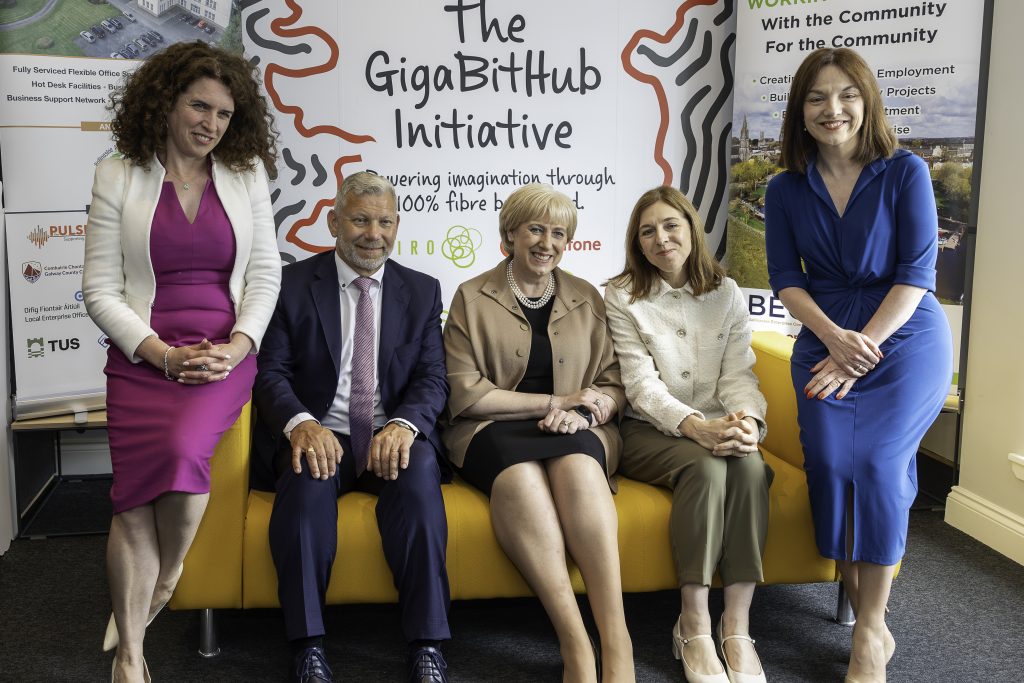 Minister for Rural & Community Development, Heather Humphreys TD, officially opened the Ballinasloe Enterprise Hub. She emphasised the importance of such facilities in revitalising rural communities.
Minister for Rural & Community Development, Heather Humphreys TD, officially opened the Ballinasloe Enterprise Hub. She emphasised the importance of such facilities in revitalising rural communities.
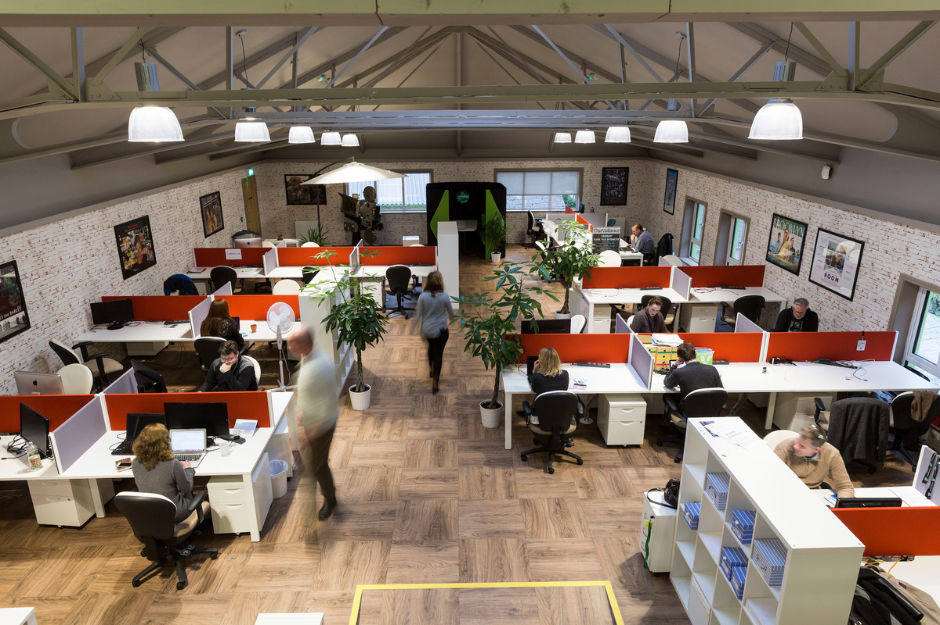 Since it first commenced eight years, with the groundbreaking Ludgate Hub in Skibbereen, 20 remote and digital working hubs have now participated in the Initiative. Collectively the 20 Hubs now host over 1,000 desks, used by a wider range of businesses from larger more established companies to newly formed start-ups. A wide range and type of companies are now using Gigabit Hubs such as
Since it first commenced eight years, with the groundbreaking Ludgate Hub in Skibbereen, 20 remote and digital working hubs have now participated in the Initiative. Collectively the 20 Hubs now host over 1,000 desks, used by a wider range of businesses from larger more established companies to newly formed start-ups. A wide range and type of companies are now using Gigabit Hubs such as 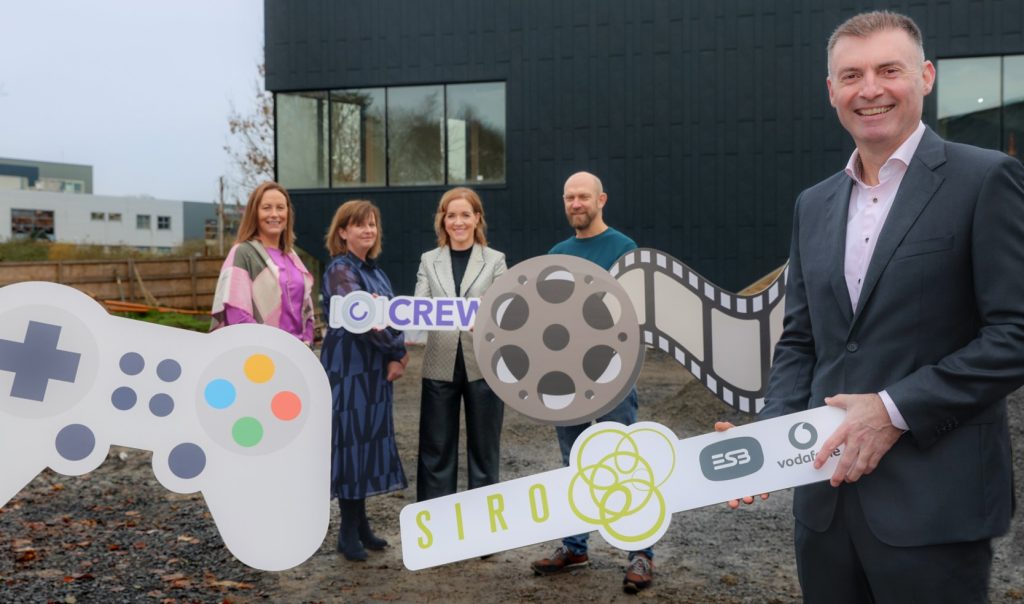 SIRO and Vodafone announce connectivity partnership (as part of their Gigabit Hub Initiative), with Galway’s latest innovation hub – Creative Enterprise West (CREW). The Hub is set to open in early 2024 and is focused on supporting businesses in creative arts[/caption]
There are a number of offices and desks available for startup companies, SME’s and individuals wishing to base themselves at CREW.
CREW “Creative Enterprise West” is a collaborative initiative led by Atlantic Technological University’s School of Design and Creative Arts (ATU Galway City, Wellpark Road), the Western Development Commission (WDC) and Ardán. Funding for the hub was received from Enterprise Ireland (EI) through the Regional Enterprise Development Fund.
The Hub, which is expected to open early in 2024, is a new purpose-built facility located on the Atlantic Technological University (ATU) Galway City (Wellpark Rd) campus, just one mile from Galway city centre.
Vodafone-SIRO’s GigaBitHub Initiative is centred on providing reliable, resilient and future proofed connectivity to digital hubs across Ireland. It empowers hubs by providing them with high-speed, high-quality full fibre broadband.
The GigaBitHub Initiative commenced in 2016 with the aim of enabling remote working and digital hubs with broadband connectivity, allowing both the hub and their users to run and grow their businesses seamlessly. Since then, the Initiative has partnered with 21 hubs in every corner of Ireland, from Ludgate Hub in Skibbereen to The Base in Stranolar in Donegal. CREW will be the third Galway hub to join the Initiative, with PorterShed in Galway City and Comworks in Loughrea already members.
Commenting on the Vodafone-SIRO connectivity partnership CREW CEO, Niamh Costello, said:
SIRO and Vodafone announce connectivity partnership (as part of their Gigabit Hub Initiative), with Galway’s latest innovation hub – Creative Enterprise West (CREW). The Hub is set to open in early 2024 and is focused on supporting businesses in creative arts[/caption]
There are a number of offices and desks available for startup companies, SME’s and individuals wishing to base themselves at CREW.
CREW “Creative Enterprise West” is a collaborative initiative led by Atlantic Technological University’s School of Design and Creative Arts (ATU Galway City, Wellpark Road), the Western Development Commission (WDC) and Ardán. Funding for the hub was received from Enterprise Ireland (EI) through the Regional Enterprise Development Fund.
The Hub, which is expected to open early in 2024, is a new purpose-built facility located on the Atlantic Technological University (ATU) Galway City (Wellpark Rd) campus, just one mile from Galway city centre.
Vodafone-SIRO’s GigaBitHub Initiative is centred on providing reliable, resilient and future proofed connectivity to digital hubs across Ireland. It empowers hubs by providing them with high-speed, high-quality full fibre broadband.
The GigaBitHub Initiative commenced in 2016 with the aim of enabling remote working and digital hubs with broadband connectivity, allowing both the hub and their users to run and grow their businesses seamlessly. Since then, the Initiative has partnered with 21 hubs in every corner of Ireland, from Ludgate Hub in Skibbereen to The Base in Stranolar in Donegal. CREW will be the third Galway hub to join the Initiative, with PorterShed in Galway City and Comworks in Loughrea already members.
Commenting on the Vodafone-SIRO connectivity partnership CREW CEO, Niamh Costello, said:
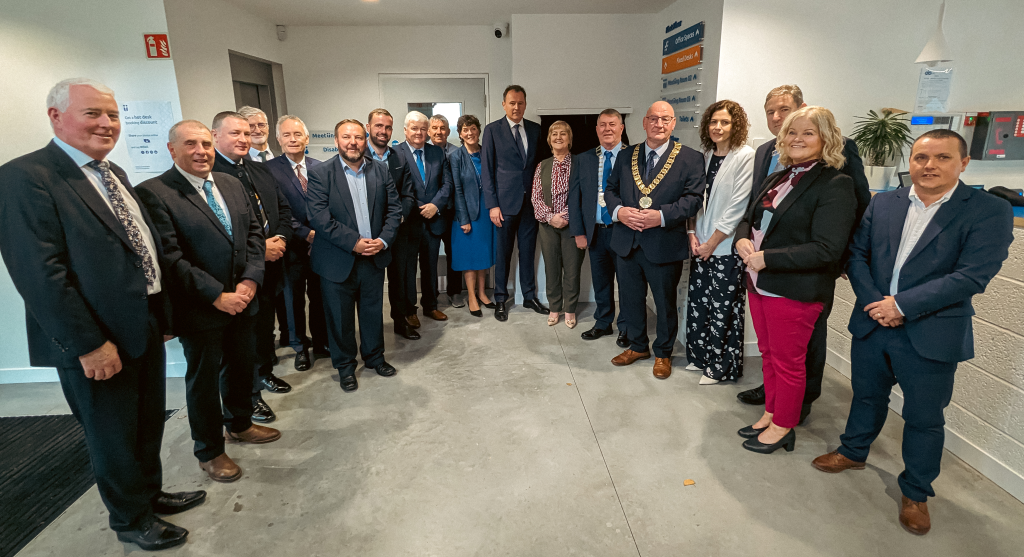
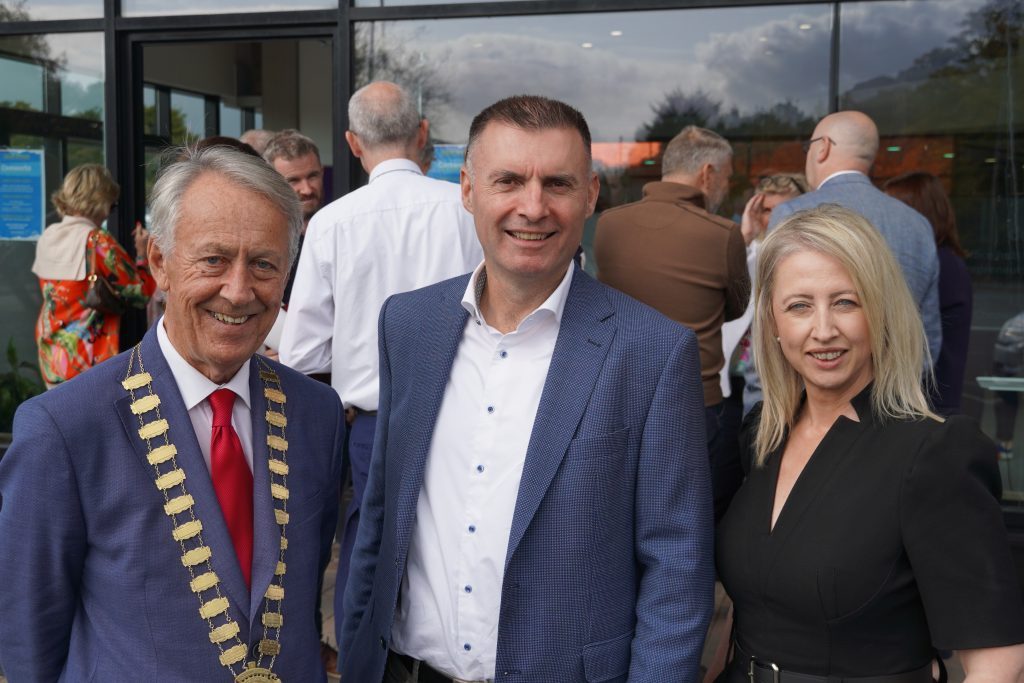 Comworks has also entered into a connectivity partnership with SIRO and Vodafone as part of the latter’s GigabitHub initiative. The Initiative supports digital hubs across Ireland with fast and future proofed connectivity. SIRO is currently building out its full fiber network in Loughrea, with the Comworks Enterprise Hub expected to go live on its’ full fibre network later this year. This will ensure that the hub and its users enjoy access to fast and reliable broadband.
Drawing inspiration from the success of the PorterShed in Galway City, Comworks is poised to demonstrate the immense potential that high quality hubs in rural settings can play in fostering innovation, collaboration, and community.
Developed by Jonathan Madden, a native of Tynagh, County Galway, Comworks is a testament to a decade-long journey in remote work. Madden's experiences, spanning multiple countries and hubs, have culminated in the creation of Comworks—a hub designed to combat the challenges of remote work, from isolation to social anxiety, and to leverage its many benefits such as collaboration, entrepreneurship and innovation.
Comworks has also entered into a connectivity partnership with SIRO and Vodafone as part of the latter’s GigabitHub initiative. The Initiative supports digital hubs across Ireland with fast and future proofed connectivity. SIRO is currently building out its full fiber network in Loughrea, with the Comworks Enterprise Hub expected to go live on its’ full fibre network later this year. This will ensure that the hub and its users enjoy access to fast and reliable broadband.
Drawing inspiration from the success of the PorterShed in Galway City, Comworks is poised to demonstrate the immense potential that high quality hubs in rural settings can play in fostering innovation, collaboration, and community.
Developed by Jonathan Madden, a native of Tynagh, County Galway, Comworks is a testament to a decade-long journey in remote work. Madden's experiences, spanning multiple countries and hubs, have culminated in the creation of Comworks—a hub designed to combat the challenges of remote work, from isolation to social anxiety, and to leverage its many benefits such as collaboration, entrepreneurship and innovation.
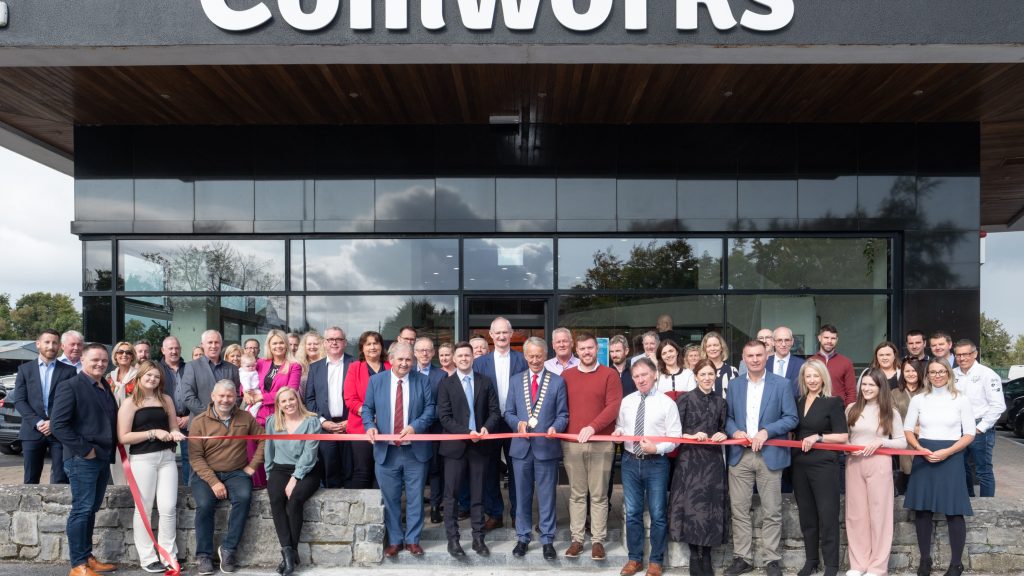 The official opening was undertaken by Minister Rabbitte with a ribbon cutting ceremony. Key industry leaders, including Vodafone Director of External Affairs Edel Briody, SIRO CEO John Keaney and Galway Rural Development CEO Steve Dolan, as well as representatives from Galway County Council, the IDA, AIB, LEO amongst others were all in attendance.
Commenting at the launch, Comworks Manager Jonathan Madden noted:
The official opening was undertaken by Minister Rabbitte with a ribbon cutting ceremony. Key industry leaders, including Vodafone Director of External Affairs Edel Briody, SIRO CEO John Keaney and Galway Rural Development CEO Steve Dolan, as well as representatives from Galway County Council, the IDA, AIB, LEO amongst others were all in attendance.
Commenting at the launch, Comworks Manager Jonathan Madden noted:
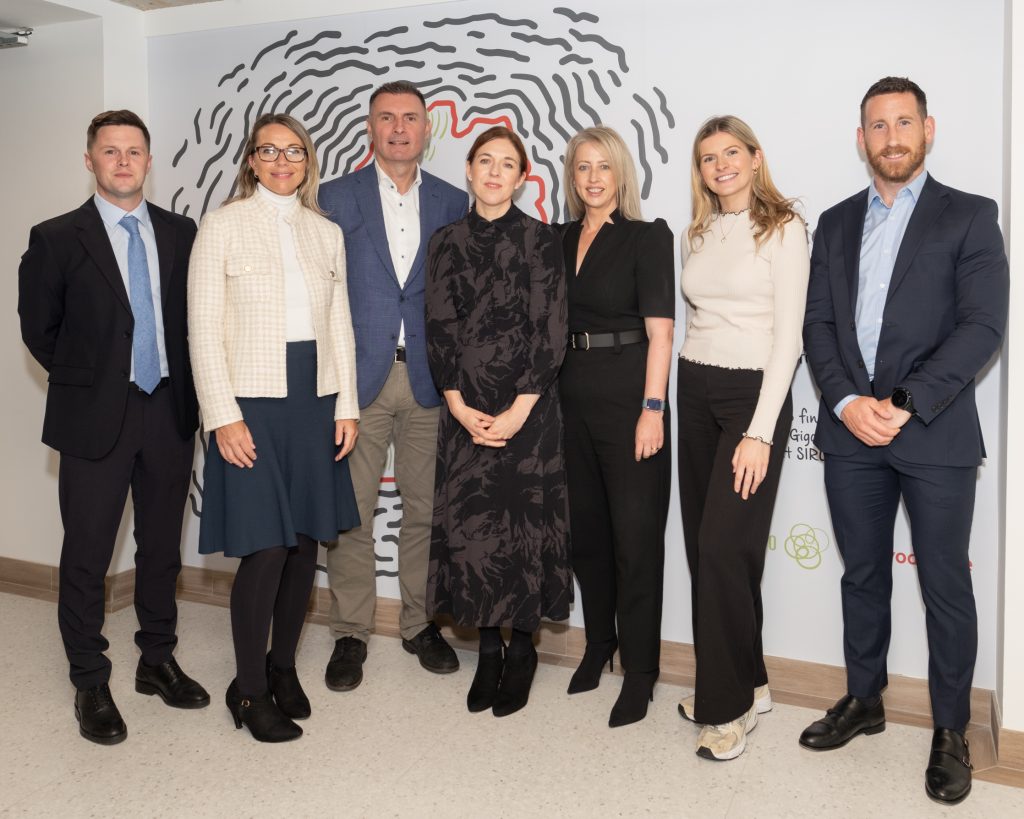 Vodafone Interim Director of External Affairs Edel Briody: “Through our GigabitHub Initiative our goal has always been to empower local business and communities through connectivity. We are delighted to connect Comworks and look forward to seeing the value, demand and need for smart working in the Galway region continue to grow.
Vodafone Interim Director of External Affairs Edel Briody: “Through our GigabitHub Initiative our goal has always been to empower local business and communities through connectivity. We are delighted to connect Comworks and look forward to seeing the value, demand and need for smart working in the Galway region continue to grow.

 (L-R, Aoife Cheung, Office Manager, Portershed, Amanda Nelson, CEO of Vodafone Ireland, Mary Rogers, CEO of PorterShed, Minister for Enterprise, Trade and Employment, Simon Coveney, Amanda Glancy, Director of Corporate Affairs, SIRO, Sheila Kavanagh, Network Director, Vodafone Ireland, Anthony Shaughnessy,Community and Production, PorterShed)[/caption]
The official opening coincides with the organisation's 7th birthday. Founded in 2016 the PorterShed has to date supported the creation of more than 835 high value jobs in the region. The new building, funded by the Department of Enterprise Trade and Employment through Enterprise Ireland's Regional Enterprise Development Fund (REDF) initiative, will become home to an additional 200 indigenous tech startup members, offering a collaborative innovation space, access to SIRO and Vodafone’s full fibre broadband, production studio, boardroom podcast studio, rooftop garden, and conference rooms.
PorterShed has already established itself as a hub for innovation and entrepreneurship under the banner of Galway City Innovation District, creating a down-town innovation community in the heart of Galway City.
[caption id="attachment_8156" align="aligncenter" width="1024"]
(L-R, Aoife Cheung, Office Manager, Portershed, Amanda Nelson, CEO of Vodafone Ireland, Mary Rogers, CEO of PorterShed, Minister for Enterprise, Trade and Employment, Simon Coveney, Amanda Glancy, Director of Corporate Affairs, SIRO, Sheila Kavanagh, Network Director, Vodafone Ireland, Anthony Shaughnessy,Community and Production, PorterShed)[/caption]
The official opening coincides with the organisation's 7th birthday. Founded in 2016 the PorterShed has to date supported the creation of more than 835 high value jobs in the region. The new building, funded by the Department of Enterprise Trade and Employment through Enterprise Ireland's Regional Enterprise Development Fund (REDF) initiative, will become home to an additional 200 indigenous tech startup members, offering a collaborative innovation space, access to SIRO and Vodafone’s full fibre broadband, production studio, boardroom podcast studio, rooftop garden, and conference rooms.
PorterShed has already established itself as a hub for innovation and entrepreneurship under the banner of Galway City Innovation District, creating a down-town innovation community in the heart of Galway City.
[caption id="attachment_8156" align="aligncenter" width="1024"] (L-R, Sheila Kavanagh, Network Director, Vodafone Ireland, Robert Marshall, Senior Public Affairs, Vodafone Ireland, Amanda Nelson, CEO Vodafone Ireland, Amanda Glancy, Corporate Affairs Director, SIRO.)[/caption]
Speaking at the official opening, Minister Coveney said he continues to be impressed by the growth of the tech sector in Galway and acknowledged the impact of the PorterShed in the region since it first opened in 2016.
(L-R, Sheila Kavanagh, Network Director, Vodafone Ireland, Robert Marshall, Senior Public Affairs, Vodafone Ireland, Amanda Nelson, CEO Vodafone Ireland, Amanda Glancy, Corporate Affairs Director, SIRO.)[/caption]
Speaking at the official opening, Minister Coveney said he continues to be impressed by the growth of the tech sector in Galway and acknowledged the impact of the PorterShed in the region since it first opened in 2016.
 (L-R, Minister for Enterprise, Trade and Employment, speaking with Siren, member of PorterShed present with Mayor of Galway, Clodagh Higgins, Sheila Kavanagh, Network Director, Vodafone Ireland, Senator Sean Kyne, Government Chief Whip and Minister of State at the Department of Health, Hildegard Naughton, Mary Rogers, CEO PorterShed, Robert Marshall, Senior Public Affairs, Vodafone Ireland, and Amanda Nelson, CEO, Vodafone Ireland.)[/caption]
Maurice O'Gorman, Chairperson of PorterShed, said:
(L-R, Minister for Enterprise, Trade and Employment, speaking with Siren, member of PorterShed present with Mayor of Galway, Clodagh Higgins, Sheila Kavanagh, Network Director, Vodafone Ireland, Senator Sean Kyne, Government Chief Whip and Minister of State at the Department of Health, Hildegard Naughton, Mary Rogers, CEO PorterShed, Robert Marshall, Senior Public Affairs, Vodafone Ireland, and Amanda Nelson, CEO, Vodafone Ireland.)[/caption]
Maurice O'Gorman, Chairperson of PorterShed, said:
 (L-R, Amanda Glancy, Corporate Affairs Director, SIRO, Amanda Nelson, CEO, Vodafone Ireland)[/caption]
Amanda Nelson, CEO at Vodafone Ireland said:
(L-R, Amanda Glancy, Corporate Affairs Director, SIRO, Amanda Nelson, CEO, Vodafone Ireland)[/caption]
Amanda Nelson, CEO at Vodafone Ireland said:
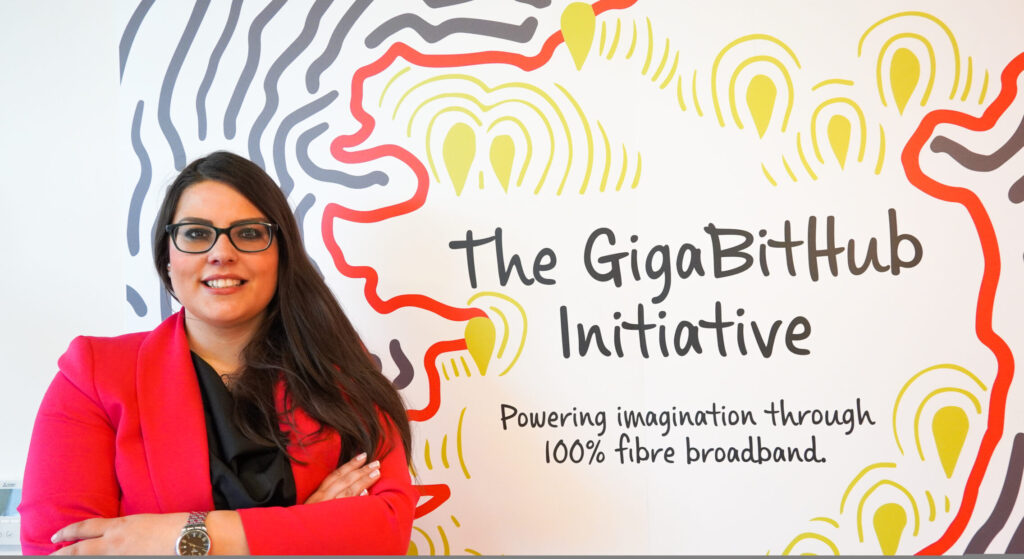 Director of The Cube, Caroline Hofman[/caption]
Director of The Cube, Caroline Hofman[/caption]
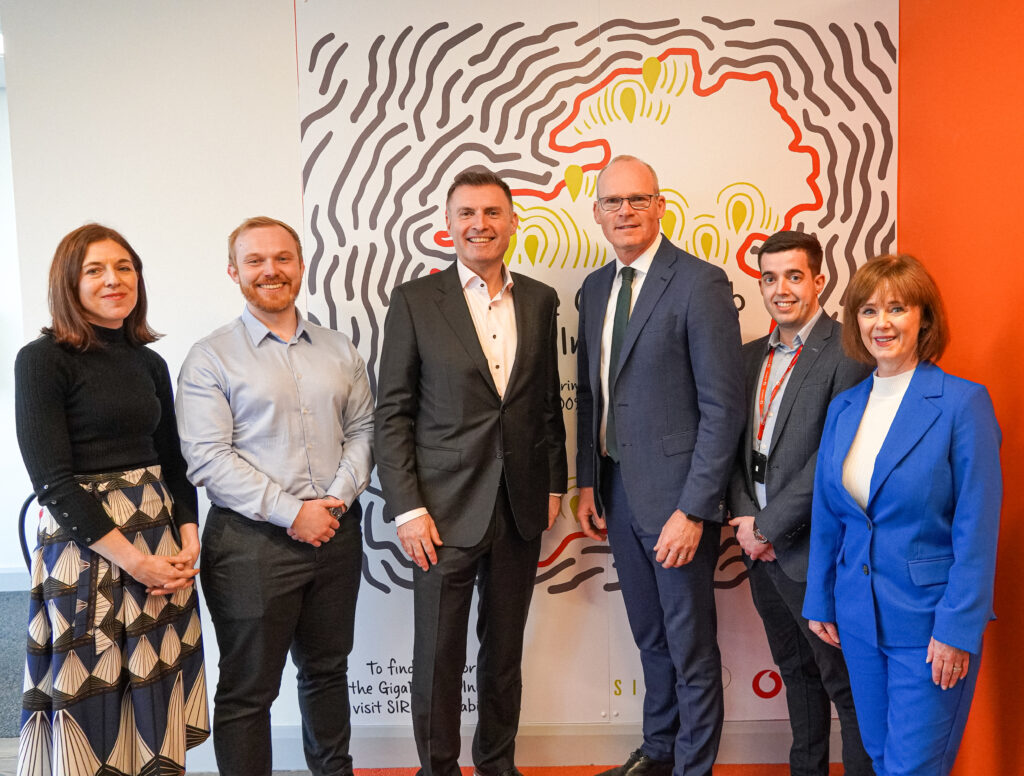 L-R, SIRO Corporate Affairs Director, Amanda Glancy, Charlie Collins, Senior Strategic Partner, VF Business, John Keaney, SIRO CEO, Minister for Enterprise, Trade and Employment, Simon Coveney, Public Sector Account Executive, Ryan Brophy Lisa Corcoran, Head of SME Business, Vodafone Business Ireland[/caption]
L-R, SIRO Corporate Affairs Director, Amanda Glancy, Charlie Collins, Senior Strategic Partner, VF Business, John Keaney, SIRO CEO, Minister for Enterprise, Trade and Employment, Simon Coveney, Public Sector Account Executive, Ryan Brophy Lisa Corcoran, Head of SME Business, Vodafone Business Ireland[/caption]
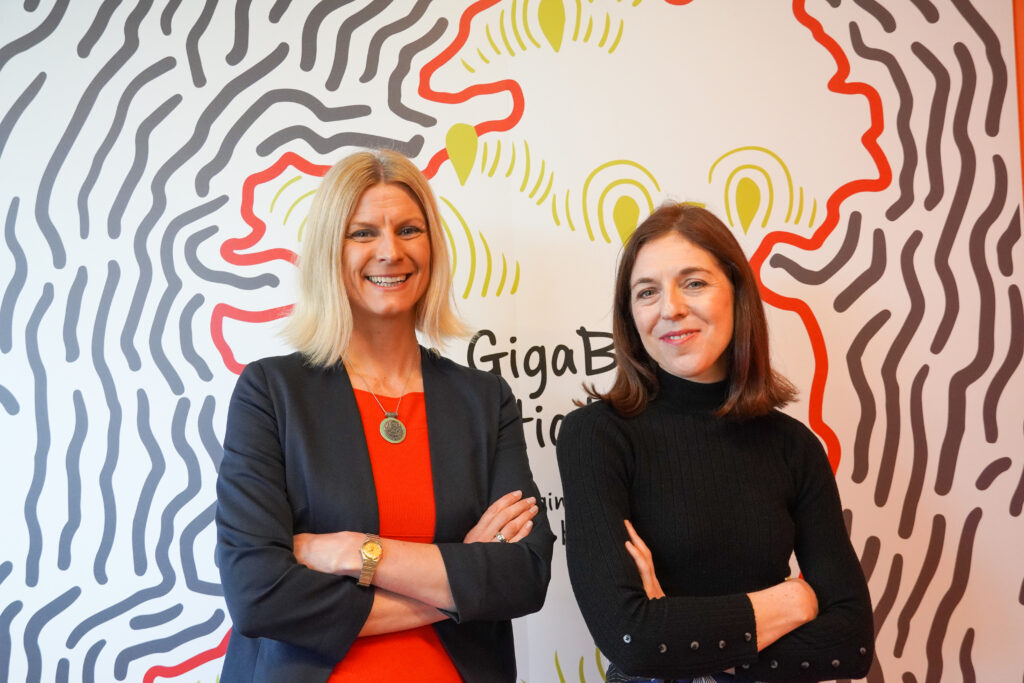 L-R, Minister of State for the Department of Agriculture, Food and the Marine, Senator Pippa Hackett and Corporate Affairs Director at SIRO, Amanda Glancy[/caption]
L-R, Minister of State for the Department of Agriculture, Food and the Marine, Senator Pippa Hackett and Corporate Affairs Director at SIRO, Amanda Glancy[/caption]
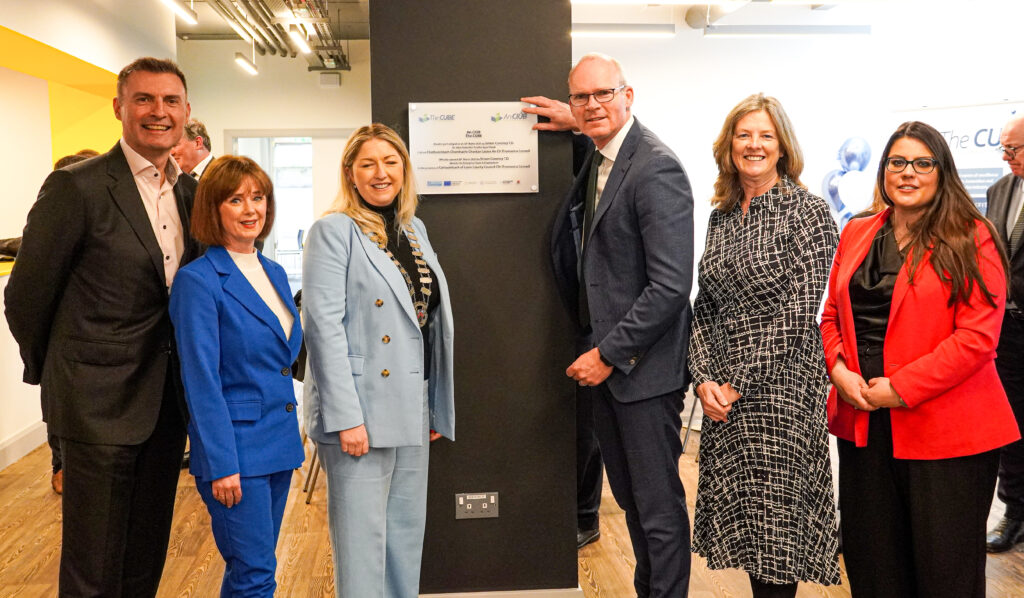 L-R SIRO CEO John Keaney, Head of SME Business, Lisa Corcoran, Cathaoirleach, Cllr. Thomasina Connell, Minister for Enterprise, Trade and Employment, Simon Coveney, Divisional Manager & Head of Regions and Local Enterprise, Enterprise Ireland, Carol Gibbins, and Director of The Cube, Caroline Hofman[/caption]
L-R SIRO CEO John Keaney, Head of SME Business, Lisa Corcoran, Cathaoirleach, Cllr. Thomasina Connell, Minister for Enterprise, Trade and Employment, Simon Coveney, Divisional Manager & Head of Regions and Local Enterprise, Enterprise Ireland, Carol Gibbins, and Director of The Cube, Caroline Hofman[/caption]